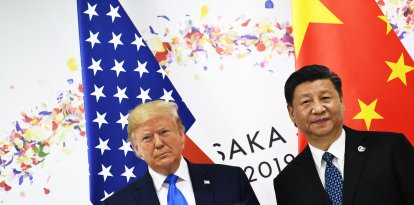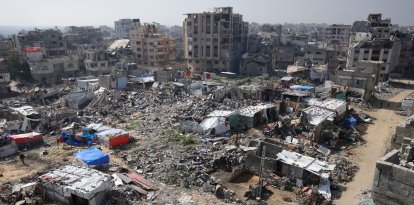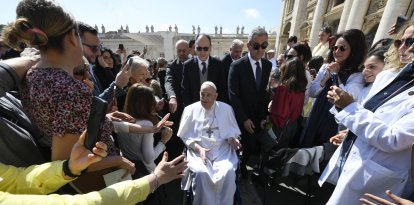The Castro regime's connection to Islamic terrorism
The documentary "Terrorism: the Cuban Connection," produced and published by the Center for a Free Cuba, reveals Cuba's troubling and persistent relationship with organizations such as Hezbollah and Hamas.

Palestinians hold posters of dictator Fidel Castro during a meeting in Gaza in November 2016.
Since October 7 of last year, when the Hamas terrorist group launched a series of savage attacks against Israel, the world once again became concerned about countries that serve as facilitators for the world's leading terrorist organizations. One of them is Cuba, a country that, under the Trump Administration, entered the list of state sponsors of terrorism in 2021.
During last May, it was thought for a few days that Joe Biden's Administration would emulate the Obama Administration and remove the small Caribbean island from this list after the State Department itself admitted that it is cooperating with the island in some activities to combat terrorism. In the end, however, the Biden Administration denied the suggestion amid intense pressure from the country's top Cuban-American Republican leaders. Today, the decision to keep Cuba on this list is especially significant, especially given the Castro regime's historical connections to Islamic terrorism and the enemies of the United States and its main ally in the Middle East, Israel.
The documentary "Terrorism: The Cuban Connection", produced and published by the Center for a Free Cuba, reveals the worrying and on-going relationship of Cuba with international terrorism.
In this film, the chilling connection of how the Cuban regime served as a key player in supporting terrorist activities around the world for decades is shown in great detail.
Inspiring terrorism from the beginning
From the very beginning of the Cuban Revolution, which in turn led to one of the longest-lived dictatorial regimes in the region, Fidel Castro's regime began to play an active role in supporting global terrorism.
"Terrorism has been an integral part of foreign policy in support of other countries' objectives," said Jaime Suchlicki, an expert on Cuban affairs quoted in the documentary.
For that plan, the Castro regime not only offered and established training camps on the island, but also intelligence services, diplomatic support and even financing to jihadist groups such as Hamas and Hezbollah, whose operations in the region have expanded by leaps and bounds. This relationship has allowed terrorist organizations to develop and perfect their tactics, putting global security at risk and posing a particular threat to the United States and Latin American countries.
This reality was born out of the origins of Castroism, which adapted terrorism as a perverse means to achieve its objectives of global revolution.
For example, since the 1960s, Cuba was a promoter of airplane hijackings, turning the island into a haven for hijackers. Between 1961 and 1973, 159 planes were hijacked in the United States and some 85 were diverted to Cuba. This data, according to aviation security experts cited in the documentary, demonstrates the complicity of the Cuban regime in the promotion of these acts of air terrorism that had their heyday in the last century.
The Center for a Free Cuba also points out that the Castro regime's connection with terrorism is not limited to Latin America. In 1966, Fidel Castro organized the tricontinental conference in Havana, with the aim of overthrowing the world order led by the United States. At that conference it was established that, to fight against Washington, all means were valid, including terrorism. The conference was a success in terms of attendance, bringing together delegates from Asia, Africa and the Americas and consolidating a support and training network for extremist groups.
According to the documentary, Havana not only offered military and tactical training, but also subversive literature translated into numerous languages and distributed globally.
For this reason, Cuba began to play its own role in the training of Middle Eastern terrorists. From the late 1960s and during the following decades, Havana trained hundreds of Palestinian terrorists in subversive tactics in secret camps on the island. Groups such as the Palestinian Liberation Organization (PLO) benefited directly from this support.
Of course, the historical connection between Cuba and Islamic terrorism creates ongoing panic today, since the United States, because of its role in the war between Israel and Hamas, is directly threatened by jihadist groups around the world. The documentary even reveals how the Hamas attack on Israel in October 2023 has renewed scrutiny of Havana's ties to Iran, Hezbollah and, especially, Hamas.
Venezuela's role and Chavezism's connection to Islamic terrorism.
The documentary also examines the ideological, political and operational brotherhood between the dictatorships of Cuba and Venezuela, revealing how this alliance amplified support for terrorism in the region.
With the late Hugo Chavez's rise to power in 1999, Venezuela became Cuba's closest and most essential ally, adopting many of its destabilizing tactics. Under the supervision of Cuban intelligence services, Venezuela essentially became a sanctuary for terrorist groups such as Hezbollah, FARC and ELN, which operate within Venezuelan territory freely while federal law enforcement turns a blind eye.
A former Venezuelan military officer, in a revealing testimony for the documentary, describes his country as a "laboratory" created by Cuba to promote terrorist activities at the international level. The extensive cooperation between both regimes materialized in the delivery of false identities, passports and other documents that facilitate the mobility and operations of terrorist groups in the region. This is a situation that should alarm the international community and put the United States and its regional allies on their guard.
Founded in 1997, the Center for a Free Cuba's mission is to promote a peaceful transition to a Cuba that respects human rights and political and economic freedoms. Its documentary can be found at YouTube.
RECOMMENDATION





















